|
Flag of Canada
Capital: Ottawa
Languages: English, French
Currency: Canadian Dollar
Religion: Roman Catholic, Protestant
National Holiday: Canada Day, July 1 (1867)
More Canadian Holidays
|
|
|
Canada is the second largest country in the world, and well known for its remarkable landscapes and unique culture. Canada is a major tourist destination that offers visitors a variety of activities from skiing, golfing, lively festivals, quaint villages, and the largest shopping mall in North America. If you are planning a trip to Canada it is smart to become familiar with their customs and etiquette, and if your trip includes opportunities to exchange gifts then here are a few tips about gift giving etiquette in Canada:
| Gift Giving Etiquette in Canada
|
- If you are invited to someone's home, the Canadian gift giving custom is to bring a host/hostess a box of gourmet chocolates, flowers or a bottle of wine.
- Guests wishing to give a gift of flowers should consider having them sent to the host/hostess home; either early on the day of the party or the day before a party, rather than bringing them as the hostess may be busy with last minute preparations.
- When receiving a gift, usually it is opened immediately when received and in front of the gift giver.
Gifts to Avoid
- Red Roses, as they are associated with romantic love.
- White lilies or chrysanthemums, as they are associated with funerals.
- Do not give cash or money as a gift.
Business Gift Giving Customs
- Business gift giving in Canada is not typically done between business associates, even during the holidays. It is appropriate to send greeting cards during the Christmas holidays, particularly as a thank you for the companies business during the previous year.
If you will be visiting Canada, you may find the following social and business etiquette tips helpful:
- Avoid controversial topics like comparing Canada with the United States, involving language, or using the term "Native Americans" in regards to indigenous peoples (often known officially as "people of the First Nations"), or the Quebec sovereignty movement.
- Canada is an ethnically diverse country that has ten provinces and three territories, and these may be grouped into regions. There are regional differences in Canada prepare to adapt. For example if your trip will include visiting Quebec then you need to learn some French.
- Business lunches or dinners are common, but the focus will typically remain on business, and the party that extended the invitation is normally expected to pay.
- Promptness is valued, make sure that you are always on time for meetings and appointments.
- Businesspeople in Canada are reserved in their manners, speech, and dress. Always maintain conservative behavior, and follow good rules of etiquette. Also, avoid talking loud and using dramatic body language.
- During business meetings refrain from talking about personal topics.
|
Commonly Used French Phrases
Bonjour (bohn-joor) - Hello
Au revoir (o re-vwoir) - Goodbye
Oui (we) - Yes
Non (no) - No
S'il vous plait (see-voo-play) - Please
Merci (mer-see) - Thank You
Excusez-moi (ex-scyuuz-eh mwah) - Excuse Me
Parlez-vous l'anglais (par-lay voo l'anglay) - Do you speak English?
|
Canadian Birthday and Christmas Traditions
Birthday
- A Canadian birthday custom in the Atlantic provinces is for children to be chased down and cornered and their noses are greased with butter for good luck. It is believed that greasing the nose makes the child too slippery for bad luck to catch them.
- A child's birthday cake will typically be a layer cake, within the layers a wrapped coin is hidden, and the child that finds the coin is the first to get a turn at all the party games.
- Children attending a Canadian birthday party may receive as a favor birthday crackers. Birthday crackers are small cardboard tubes that are decorated with colored paper, and when the children open them they make a popping noise and they will find a hidden treasure inside, typically a small toy or candy.
Christmas
- Christmas in Canada is celebrated in many of the same ways as the United States. A Canadian Christmas tradition is the "lighting of lights" that decorate public parks and buildings, they are traditionally lit for the holidays at the same moment at 6:55 on the first Thursday in December. The lighting of Christmas lights in unison began in 1986 and is a way to show unity during Canada's Christmas celebrations.
|
Resources
Related
International Gift Customs
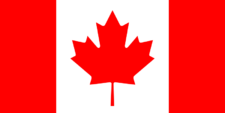
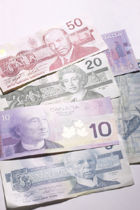
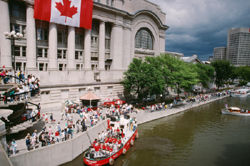
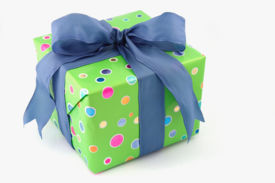
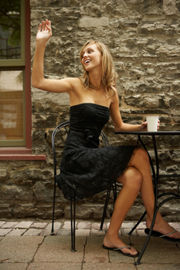
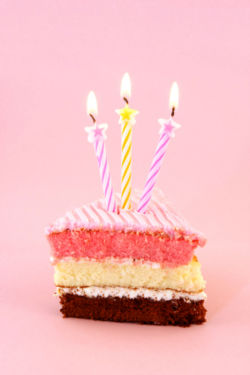

 Printer Friendly
Printer Friendly
